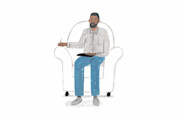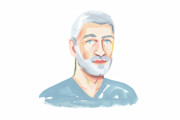The word “anxiety” has become unavoidable. It’s in pop culture. It’s in basically every conversation. It’s in the news.
But what is anxiety, exactly? And why does it seem like everyone is suffering from it?
What is anxiety?
According to the American Psychological Association (APA), anxiety is "an emotion characterized by feelings of tension, worried thoughts, and physical changes like increased blood pressure."
Anxiety is also the mind’s reaction to real or perceived threats or stressors, and the physiological reactions that accompany that reaction.
The feeling of anxiety exists on the same spectrum as the feeling of fear. This spectrum of emotions is hardwired into our brains to keep us alert and prepared to “fight or flee” a dangerous situation—think of a hiker running from a ravenous wolf. Both fear and anxiety involve anticipating; when you experience fear, you’re experiencing the anticipation of pain or danger.
When you’re anxious, however, it’s usually not exactly mortal peril you’re anticipating.
And worry can actually feed anxiety.
You know the teeth-chattering, on-edge feeling you have the night before a job interview? Or the queasy feeling in your stomach just before you give a big speech at a loved one’s wedding? That’s anxiety. It’s the creeping sense of dread that gives us butterflies in our stomachs and makes our palms sweat.
Okay, so it’s worry?
Not exactly. As Dr. Nikki Rubin puts it, while anxiety is an emotion, “worry is a behavior.” Of course, it’s not a behavior the way throwing a tantrum is a behavior—it is a “covert behavior, meaning it's a behavior that is happening inside of your body that no one can see you doing.”
And worry can actually feed anxiety. “The more we engage in worry behavior (i.e. trying to predict what will happen), the more anxious we become because we are not able to obtain the information that we hope to gain (i.e. certainty),” says Dr. Rubin.

Well, that doesn’t seem like a big deal
It isn’t, necessarily! Being anxious that you’ll miss the bus is a totally rational feeling. “Some level of anxiety is common, or functional because it gives us a level of motivation to do our daily tasks,” says Dr. Deanie Eichenstein.
What is a big deal, is when that feeling of anxiety begins to interfere with daily life. “When someone's level of functioning is impacted, that is when it is clinically significant,” says Dr. Eichenstein.
So if you’re so anxious about missing the bus that it’s literally all you can think about and you never make it to the bus stop at all, your anxiety may be dysregulated, or you may have an anxiety disorder.
And anxiety disorders are a big deal. Beyond affecting one’s mood, anxiety disorders can actually increase one’s chances for physical illnesses, and/or exacerbate preexisting physical ailments. Left untreated, anxiety disorders can metastasize into severe mental health issues including OCD and agoraphobia.
How do I know if I have an anxiety disorder?
Most simply, you have an anxiety disorder if your anxiety is making your everyday life worse just by its oversized presence. This can present as a stomach ache that won’t go away or uncontrollable teeth grinding, but it can also present as an overwhelming urge to control that which you can’t.
So when you’re wondering why all your friends seem to be suffering from anxiety, well, in the words of Dr. Rubin, it’s “Because they are!"
Dr. Rubin says symptoms present as “physiological sensations of anxiety that are consistent throughout the day, or behaviors that are reflective of anxiety (e.g. worry, checking, attempts to control outcomes/situations/other people) that feel out of control or are dominating someone's experience.”
Symptoms of anxiety
Physical symptoms include:
Pounding or racing heart and shortness of breath
Sweating, tremors, and twitches
Headaches, fatigue, and insomnia
Upset stomach, frequent urination, or diarrhea
In more serious cases, sufferers can experience panic attacks. These attacks are bursts of anxiety symptoms that overwhelm people physically. Dr. Nikki calls them “discrete episodes where physiological sensations reach an intense crescendo during which someone may feel out of control or believe that they are going to die/have a heart attack.”
It is important to note that one cannot actually die from a panic attack.

Is an anxiety disorder a mental illness?
Yes. Dysregulated anxiety is thought to be one of the most common mental illnesses, with 19% of U.S. adults living with it. So when you’re wondering why all your friends seem to be suffering from anxiety, well, in the words of Dr. Rubin, it’s “Because they are!"
"Anxiety becomes elevated or dysregulated during times of stress and when uncertainties are large or many. This moment in history has been filled with a multitude of unbelievably intense stressors, with many, many unknowns.”
How can I address my anxiety?
There are dozens of treatments for anxiety, as everyone experiences it (at varying degrees of intensity) at some point in their lives. Talk therapy and/or cognitive-behavioral therapy (CBT) have been shown to be effective in finding ways to cope with and address elevated anxiety.
Occasionally this therapy is augmented by medications that address the symptoms of anxiety like a fluttery feeling in the heart or stomach cramping. Many anxious people also get relief from mindfulness practices, which are aimed at helping people “detach” from the stressors that cause anxiety.
If feelings of worry or fear or dread are dominating your life, the best first step is to talk to your doctor. There is plenty to be anxious about these days; your doctor will be able to help you determine whether your anxiety has tipped over into the level of a disorder and if so, will work with you to design a plan of action by connecting you with a therapist who can help.
Because anxiety—like stress—can feed itself, it’s important to not blame yourself for how you feel. Everyone deserves a life free from the gnawing pang of dysregulated anxiety.
Anxiety quiz
To help you determine if you have symptoms of an anxiety disorder, take Monarch’s two minute free anxiety quiz. Taking the anxiety quiz can help you monitor your mental health. However, the results cannot replace a clinical diagnosis.
Gutowitz, J. (n.d.). Anxiety is becoming visible in pop culture—finally. Nylon. Retrieved November 6, 2020, from https://www.nylon.com/anxiety-pop-culture
Health Essentials from Cleveland Clinic. (2019, December 9). What Happens to your body during the fight or flight response? Health Essentials from Cleveland Clinic. https://health.clevelandclinic.org/what-happens-to-your-body-during-the-fight-or-flight-response/
Jovanovic, T. (2013, April 4). Anxiety: What is anxiety? Signs, causes, symptoms. Anxiety.org. https://www.anxiety.org/what-is-anxiety#anxiety-and-physical-health
Marks, H. (2011, April 29). Stress symptoms. WebMD. https://www.webmd.com/balance/stress-management/stress-symptoms-effects_of-stress-on-the-body#1
Mayo Clinic. (2017). Generalized anxiety disorder: Diagnosis and treatment. Mayoclinic.org. https://www.mayoclinic.org/diseases-conditions/generalized-anxiety-disorder/diagnosis-treatment/drc-20361045
McBain, S. (2014, April 18). Everybody is anxious, and nobody wants to talk about it. The New Republic. Retrieved November 6, 2020, from The New Republic website: https://newrepublic.com/article/117448/everybody-anxious-and-nobody-wants-talk-about-it
NAMI: National Alliance on Mental Illness. (2020). Anxiety disorders. Nami.org. https://www.nami.org/About-Mental-Illness/Mental-Health-Conditions/Anxiety-Disorders
National Institute of Mental Health. (2017, November). Any anxiety disorder. National Institute of Mental Health. https://www.nimh.nih.gov/health/statistics/any-anxiety-disorder.shtml
Scott, J. (2018, January 4). Why millennials are the most anxious generation in history.; Vogue Australia. https://www.vogue.com.au/beauty/wellbeing/why-millennials-are-the-most-anxious-generation-in-history/news-story/755e7b197bdb20c42b1c11d7f48525cd
Shorter, E. (2016, August 20). Why have we become so anxious? Psychology Today. https://www.psychologytoday.com/us/blog/how-everyone-became-depressed/201608/why-have-we-become-so-anxious








